Maiduguri city slogans:
- 2007 – Home of Peace
- 2012 – Home of Pieces (unofficial)

I have been trying to visit Maiduguri, a regional capital tucked away in the northeast corner of Nigeria, for years. Despite spending much of the past five years focusing on the area for work, a plethora of canceled trips and failed visa attempts meant I still hadn’t been on the ground by 2017. So when I found out I would be traveling to Nigeria for a conference (finally!), I figured I had to give it my best shot to visit the country’s northeast corner as well.
Prior to that though, I had to get a visa at the Nigerian Embassy in Addis Ababa. That is a whole story in itself, and one best relayed orally. If you still care about anything by the time you finish reading this post, demand this of me the next time I annoy you with my presence.
There are surprisingly a few different airlines that operate near-daily flights to Maiduguri from the Nigerian capital of Abuja (where my conference was) these days. This was not the case just a few years ago, as the city was the epicenter of the Boko Haram crisis, forcing the airport’s closure. In fact, Maiduguri is largely considered to be the “birthplace” of this nefarious movement, which made visiting all the more intriguing.
While the violence still rages in the countryside, security has increased drastically in the city, meaning that those days when the airport was closed are long (and hopefully permanently) gone. It is now its routine for foreigners, largely operating within a humanitarian or security context, to make the trip (i.e. Maiduguri as the next hot spring break destination, as I was promised by no one but which I can truly emphasize the “hot” aspect of, is still just a few years off).
As soon as I landed I immediately felt a wave of dry heat (another emphasis on both dry and heat). The rainy season hadn’t quite yet begun, and the daily temperature hovered in the low 100s. But it felt comfortable. There is something about the Sahel – a section of the world equal parts dusty, dry, and scorching – that has a certain allure. It is inexplicable when explained in such non-alluring terms, but in one sense I felt like I was back in Burkina Faso, producing a wave of calm and reminding myself that one day I would like to spend 27+ years living in this climate (to which Christine does not realize she has signed up to). In fact, given that it had been cold and raining for nearly a week straight in Addis when I left, the chance of pace was much welcomed!
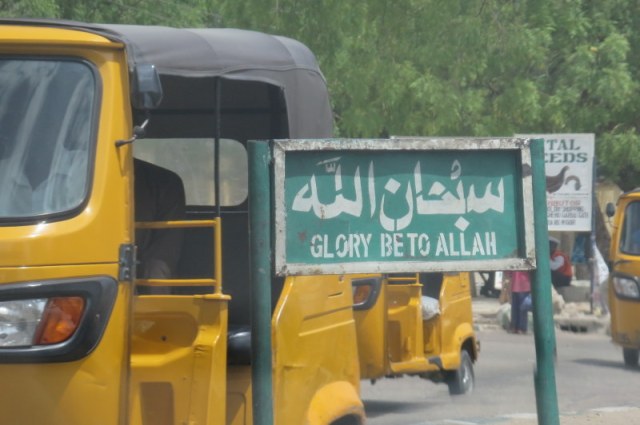
Maiduguri it is!
Alas, I was still a little nervous going in. I had heard of some people having issues getting into the city. There is a special procedure for all foreign nationals flying to Maiduguri, despite still being a part of Nigeria and technically no need for special permission. It is still under a state of emergency though, and the seat of a veritable war against militant Islamists. So I can understand the extra security, though it seems the screening of foreigners is more to keep a track on who is doing what, rather than any procedure to enhance our, or the city’s, safety.
Fortunately, a local colleague happened to be on the same flight as me and I had enough documentation – that combination allowed me to pass through with ease. In fact, the security guys were quite the joksters – when I explained myself and my mission to one of the guys, the head security guy (in a wheelchair – not sure if this was due to any recent conflict incident) offered to take me right to Sambisa Forest, the headquarters of the Boko Haram movement! Something tells me he’s made joke that to an unsuspecting foreigner visiting his city for the first time before (needless to say as intrigued as I was, I did not take him up on his offer).
Another reason I really wanted to visit the city is that over the past five years I have focused on the Lake Chad Basin professionally, and thus have worked with a number of contacts from Maiduguri, that I had never met in person. With some, I even chatted via Skype on a weekly basis for years (only rarely did they claim to be a deposed prince who just needed my credit card number to assert his rightful place on a vast, gold-filled throne). So part of the allure of finally visiting Maiduguri was to meet these contacts and see them in their element.
One friend in particular was very excited that I was coming. I had let him know shortly before, and as soon as I got to my hotel, I gave him a call. He said he was on his way – I wondered if I would even recognize him. I had seen so many photos over the years, but seeing someone in person for the first time is a different story. Luckily the hotel parking lot was quite empty when he showed up, so it was fairly obvious who was who (that did not stop me from pretending I was Big Bird for a while, just to see if Snuffleupagus happened to be lurking around).
I also thought it might be a bit awkward to meet and spend much of the next four days together, as the extent of our relationship previously had centered around twenty-minute increments of Skype conversations. I was fairly pleased to know, however, that our virtual conversational skills quickly translated to real world interactions, and the typical awkwardness that characterizes all my human interactions was present at a lower than usual level.
In any case, Richard took me out into the city, and I was finally exploring Maiduguri for the first time, after years of anticipation. We passed by all these areas I had read about and Richard had take pictures for us. For example, the notable city gate was upon us as soon as we exited the hotel. There was a sense of accomplishment in some ways – I always knew when I was sitting in the dregs of Crystal City writing report after report on specific neighborhoods of Maiduguri with Richard’s help, that one day I would get out there and actually see these sights for myself. I was just shocked that I had been right (that rarely occurs), and this day had actually arrived.

City gates!

Shehu (traditional ruler) palace
A quick background on Maiduguri – as mentioned, it’s the birthplace of the ravenous terrorist organization, Boko Haram. For a few years around 2011 to 2013, the city was essentially off limits for foreigners, as Boko Haram militants held sway in many neighborhoods. The movement wound up fleeing for the countryside in mid-2013, in large part thanks to the emergence of civilian vigilante actors opposed to their presence. Since then a relative calm has returned to the city, in turn allowing foreigners to start frequenting it. Maiduguri has become the hub of both the continued operations against Boko Haram, but also the response to a massive humanitarian disaster ongoing in the region, due to people fleeing from Boko Haram’s predatory presence in the countryside. Nonetheless, while the city is more peaceful than before, Boko Haram retains a sort of fascination/obsession with it, and consistently attempts to intimidate it, often through the form of young and likely coerced suicide bombers. Many of them are intercepted on the city’s outskirts resulting in few to no civilian casualties, but penetrations do occur, ensuring that while it feels like and is more or less a safe city, security is never far from anyone’s mind.
Nonetheless, my four days there were without incident, and it really did feel like a normal city – as safe and secure as anywhere else where temperatures rise to the 120s. Richard was a gracious host, introducing me to his friends and family as if we were old friends (given that we really were, just of the Internet variety – but hey, that’s how most of America meets their parents for the first time these days, isn’t it?).
While we toured much of the city, one thing that surprised me most was how good the food was! It is a bit ironic, given that the region is facing an impending famine, but non-displaced Maiduguri residents seem to have adequate supplies, and some of those supplies are in fact quite delicious!
While visiting a cattle market near the outskirts of the city, we picked up some suya, or essentially grilled meat with some onions and a dry pepper rub to dip in. It was so durn good that I didn’t even realize it, but I talked about it essentially non-stop to such a degree that Richard insisted we go back the next day just to shut me up, despite it being a 30-minute drive one way (and if you’re asking why we visited a cattle market given I was not in the business of purchasing some stock to take back to Addis, well I’ll tell you. One way Boko Haram funds itself is by stealing cattle in rural areas and then giving them to complacent middlemen who in turn sell them in local cattle markets for a lower price & split the profits – this particular cattle market was even shut down back back in 2016 for hot minute, to prevent this practice. Nonetheless, no such nefarious activity was apparent, but I may have been distracted by the prospect of all this cattle transforming into delicious mountains upon delicious mountains of suya – in case you are wondering, no I have never had a single vegetarian tendency in my life!).

pre-suya cattle . . .

suya in preparation
Richard’s sister also insisted we come over to his family’s house for lunch one day. She had prepared a chicken dish with a peanut sauce, along with a yam-type side dish. To complement the meal I bought the drinks, which consisted of chapman, or a local punch-type soda. The meal was delicious, perhaps even rivaling the suya vendors. I ate until I couldn’t eat anymore, then I ate some more. Having a sumptuous home-cooked meal in Maiduguri was never part of what I had dared to envision during my daydreams of visiting the city, but it made me feel quite welcome, and dare I say invoked a desire to extend this trip to an indefinite duration.

a delicious meal

meeting the whole family
While we were not eating, we also checked out a few of the necessary voyeur terrorist tourism-type sites, such as the area where Boko Haram founder Muhammad Yusuf used to preach (his mosque and house have since been razed, but some of the buildings nearby still have bullet holes from the 2009 uprising that pit his group against the government), and Gwange neighborhood (one of the poorer areas of the city, that I frequently saw pop up in the news circa 2011-12 as the site of near daily violence).
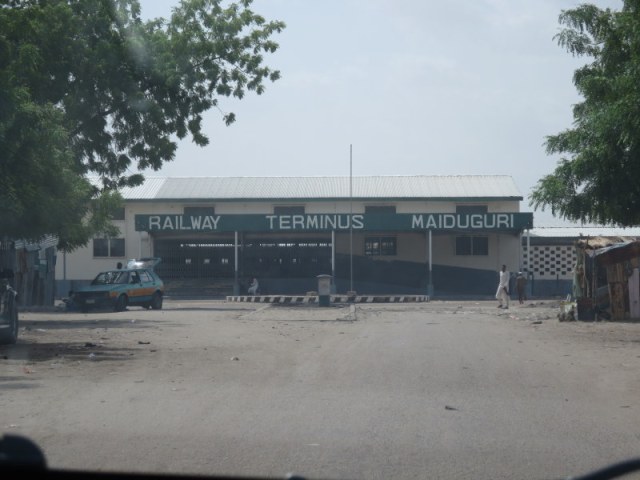
area of the city in which Muhammad Yusuf used to preach

site of the former mosque

continued scars
Other visited institutions of the city also used to be the site of significant violence, but have since recovered. Monday Market, the central market in Maiduguri, suffered from multiple Boko Haram attacks, but you wouldn’t be able to tell today as we walked around a large central market not unlike any other in West Africa. It also seemed to have plenty of food available, in contrast to the dire situation faced by many in this part of the country.

kicking it in Monday Market

grains available
On that note, we also visited a few IDP camps, to get a sense of the situation faced by many. There was a distinct difference among the camps we visited in terms of official response and more makeshift settlements, but it was also clear a number of international NGOs had heeded the call and were present. A few of the IDPs recounted their horrific tales of having to flee their home villages due to Boko Haram violence, and their desire to return as soon as they can to continue with their lives. A long-line of brightly dressed women waiting for a food handout along the side of the road as we left the camp, directly contrasted to the seeming normality we had seen in the market.
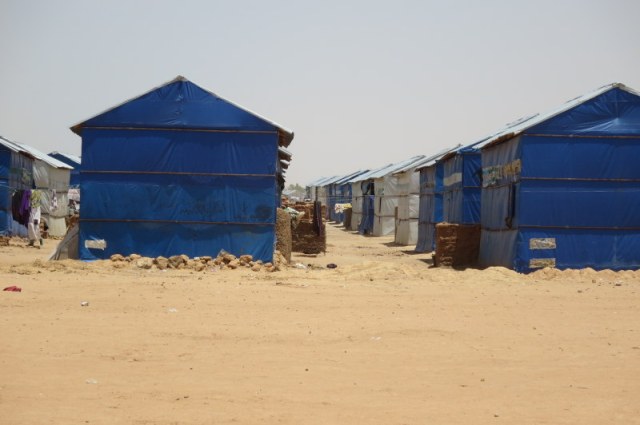
Dwellings in IDP camp I

Dwellings in IDP Camp II

food line
The University of Maiduguri (UNIMAID) is another Maiduguri institution, and despite Boko Haram’s abhorrence of Western-style education, was largely was spared during even the height of the conflict. It is located, however, on the southeastern edge of the city and encompasses a large campus which is not all fenced off, thus making it an easy and recent target of Boko Haram violence. It was the university Richard and most of his family & friends had attended, so we went to visit there as well. Security was a little tight and I had to explain myself to gain entrance – despite the presence of security personnel around the city, nowhere else were we stopped. We eventually got in through the first gate, after convincing the guards that a bearded Pakistani who studies terrorism and at times gets mistakenly placed on no-fly lists, was of little threat to them.
But once inside, we went to where Richard and his friends typically hang out. It was a couple of benches underneath a tree along a heavily trafficked sidewalk, next to some stores and other guys selling snacks. In other words, the perfect place to be seen, but also relax and see. We ate some watermelon and talked with his friends for a while. The whole experience was so normal, it was almost surreal for me to imagine that all these guys had basically lived through a war. The setting could’ve taken place on any college campus anywhere in the world, and I had to keep reminding myself I was indeed in Maiduguri (although the uproar that ensued once I explained I didn’t want kids probably would be more replicated at a place like Bob Jones University, rather than the ones I attended).

hanging at the university
In fact, Richard’s whole life seemed so much more normal than I had envisioned. He lived by himself in a one-bedroom apartment, drove a car, hung out with his friends, watched downloaded movies on his tv, went on dates with his girlfriend, and generally led a life typical of a mid-20s young male. Of course, the electricity in his house was out at least half the month, he struggled to find steady work, and had to dodge the occasional suicide bomber. But, aside from that . . .
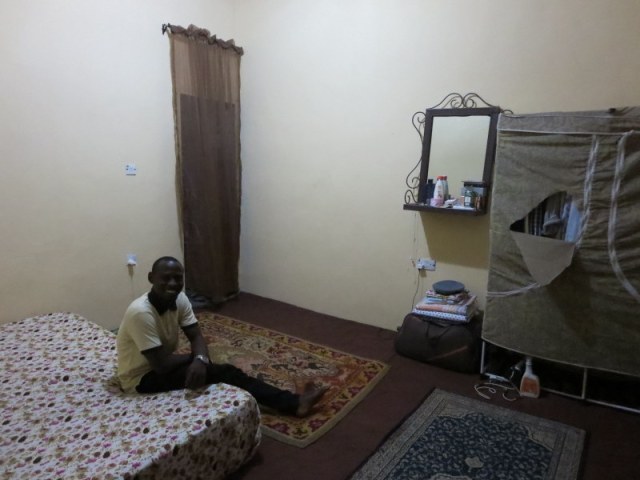
Richard in his pad
One of the other areas we visited was the Sanda Kyarimi Park Zoo. The zoo had apparently stayed opened throughout the conflict, though it may have seen some better days. A collection of animals, namely elephants, ostriches, and alligators, highlighted its presence, but it served as a sort of success story, a part of the city that refused to cower in the presence of militancy, and survived throughout (the animals themselves had refused Boko Haram’s incessant recruitment attempts). A sort of symbol of the city’s resilience. At the same time, however, it appeared the animals served as a secondary purpose, with the primary one being of an area for young couples to spend time together, with only a leering ostrich to judge them. Another stark reminder that the perverse ideology of Boko Haram, despite its stranglehold on this city for some time, clearly does not represent the entirety of the population. An obvious fact, but one that is nice to see visible signs of at times.

spying on couples

some more creeping

he’s definitely creeping too
Finally, perhaps my other favorite event was when a massive sandstorm preceded a rainstorm, darkening the sky almost immediately. The storms in the Sahel, while less frequent than the daily affliction of rain in Addis between June to September, are simply more dramatic. Despite barely being able to keep my eyes open to all the dust circling around, I cherished the experience.
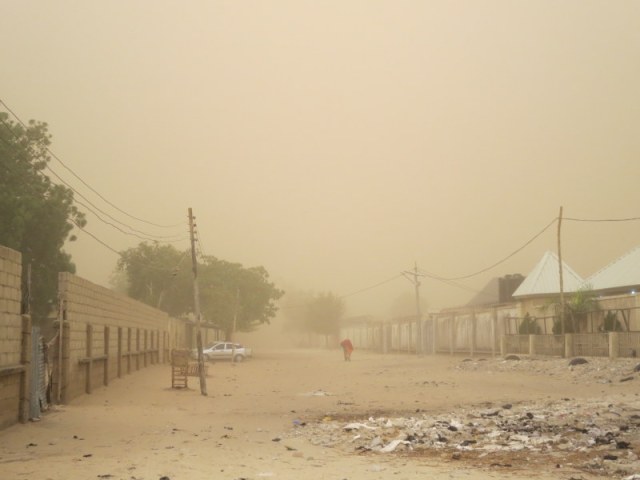
and the sky darkens

All in all, the trip to Maiduguri was a success, not least of all given that no security incidents occurred (despite some scares in the weeks after). The security risk to the city was palpable – there is a nightly curfew, the civilian vigilantes set up their checkpoints in the early evening, there are posters of wanted militants around the city, and regular convoys of military officers and armory go by. But at the same time, Maiduguri is as normal a city as elsewhere in the Sahel/West Africa region, and life for most of its residents goes on. The Boko Haram crisis has clearly had an effect – for example there are none of the motos that are ubiquitous elsewhere in West Africa as they were banned since Boko Haram easily used them as a getaway for hit and run assassinations – rather these have been replaced with the less escapable three-wheeled tuk-tuks. Examples like that abound of the effects the Boko Haram crisis has had on the city, not least to speak of the devastated countryside. And while much of Borno state is suffering and the IDPs in Maiduguri as well, it is easy to feel a sense of normalcy in the city and forget about the issues surrounding it.
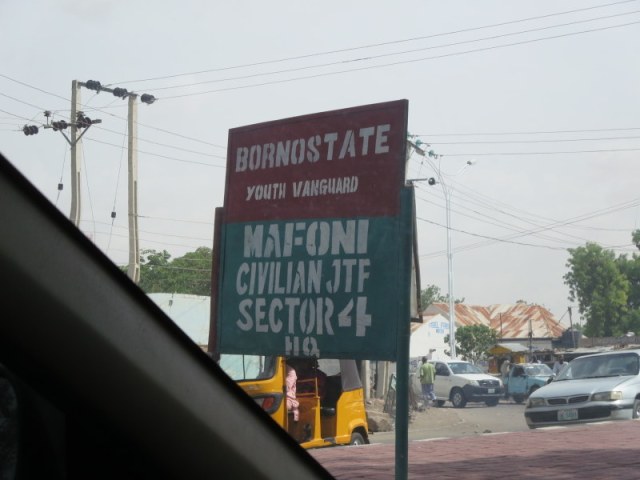
youth vigilantes sign

Anti-Boko Haram army poster

(poorly shot) movement of security personnel
At any rate, I had accomplished a key personal and professional goal in finally setting foot in a city I had read so much about, and meeting the contacts I had worked so much with. Nonetheless, the trip was short, in fact too short – four days was certainly enough to check off the box, but it just added another item to the list – which is to return soon and for a lengthier duration!
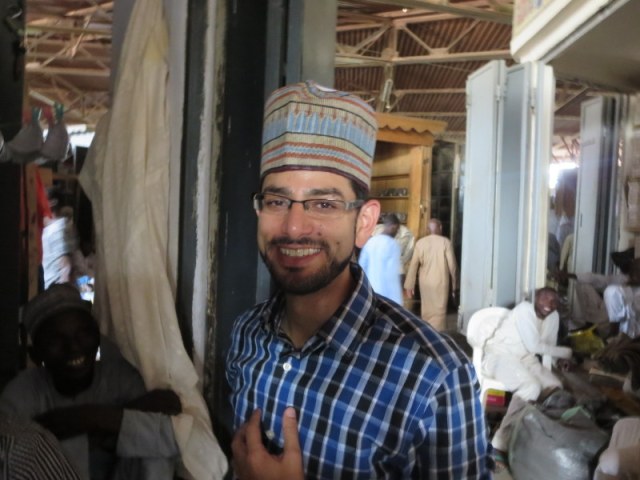
next time I’ll make this hat work!